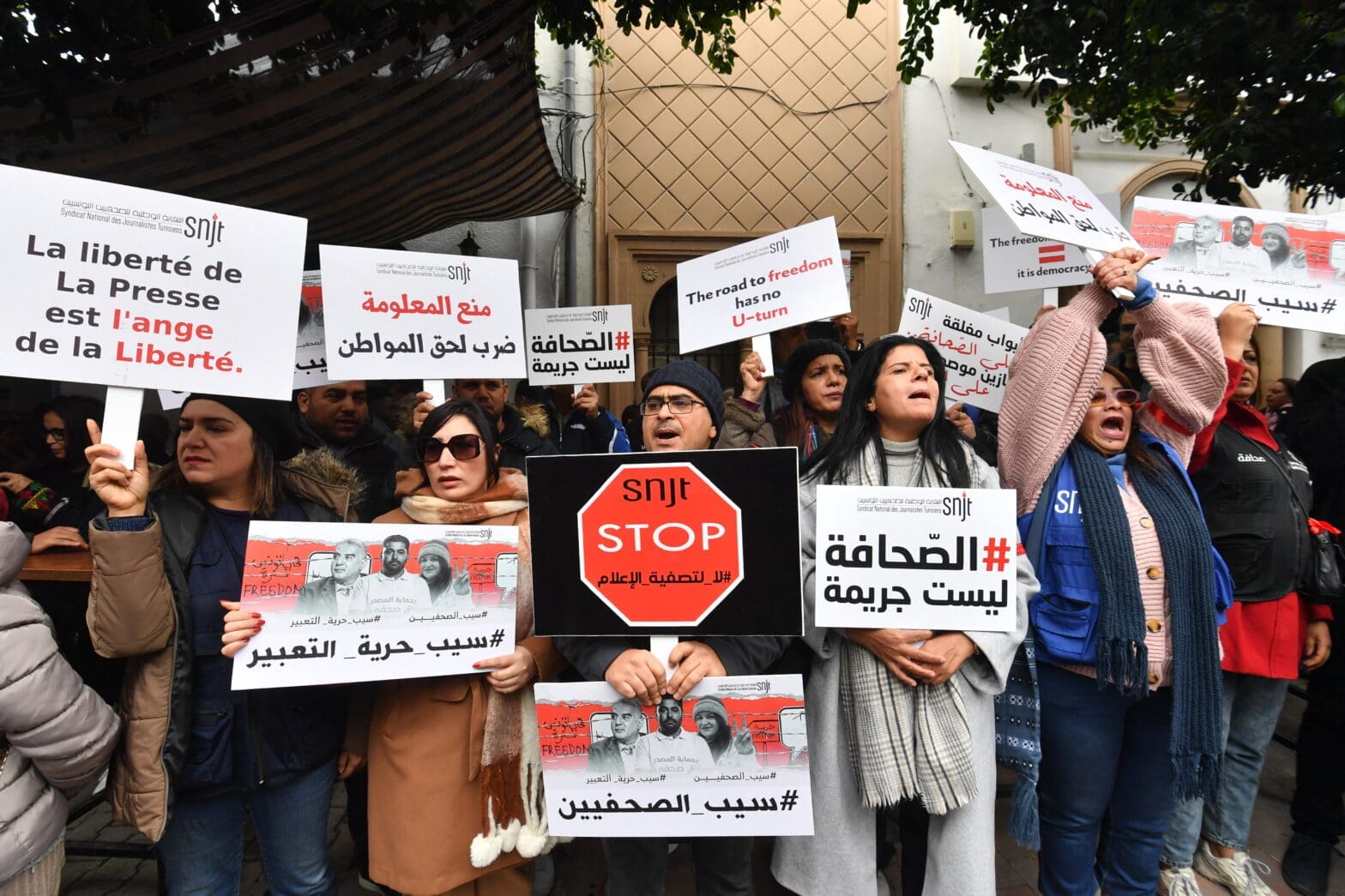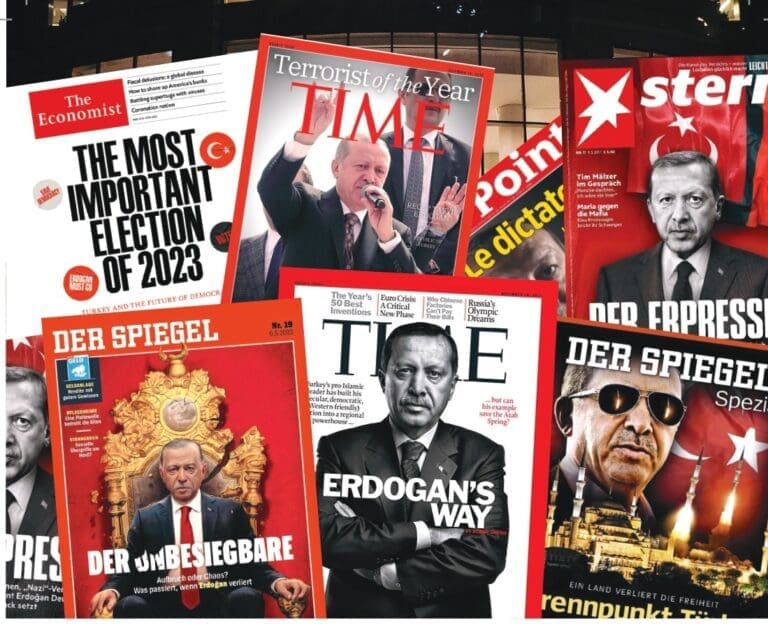
Tunisia’s Fading Spring:
Media Repression Amid Democratic Detours
Issue Brief, November 2024
Key Takeaways
Democratic Backsliding: Tunisia, once seen as a model for democratic transitions, has lurched in an authoritarian direction since 2021. President Kais Saied won a second term in the tightly controlled October 2024 presidential election, further consolidating his grip on power.
Media Repression: Tunisia’s democratic backsliding has severely impacted press freedom. Increasing legal and political constraints on the media are shrinking the space for freedom of expression.
Civil Society Resistance: Tunisian journalists and media professionals continue to resist these constraints and work to safeguard press freedom, but they have limited support both domestically and internationally.
Future Contestation: The struggle between the Tunisian government and journalists is likely to persist, as its outcomes will be determined by the evolving political landscape.
Tunisia’s Escalating Authoritarianism: Context and Implications
On October 6, 2024, Tunisian President Kais Saied was elected to a second term with more than 90 percent of the vote.1 The election was marred by low turnout of 29 percent, arrests of Saied’s opponents, a crackdown on public criticism of his government, and preceding years of sweeping measures that have severely degraded constraints on his power.
Tunisia, once seen as a beacon of hope for democratic transitions in the Arab region, has seen a major democratic reversal—since Saied’s dramatic 2021 power grab—in the form of attacks on institutions, political pluralism, and freedom of expression.
The press has been a primary target of this campaign. On July 6, prominent Tunisian lawyer and regime critic Sonia Dahmani was sentenced to a year in jail for “spreading false news,” after expressing views deemed critical of Saied and his policies in a televised interview. This was just one of many arrests of Saied’s political opponents and public critics, which intensified ahead of the October election.2
Saied came to power in 2019 on the back of an economic crisis, exacerbated by the COVID-19 pandemic and deepening public disillusionment with the political system that had emerged from the 2011 pro-democracy uprising. Years of socioeconomic frustrations had been blamed for contributing to a rising tide of radicalization and violent extremism among Tunisian youth.3
Saied, a retired law professor, political maverick, and vocal critic of the post-2011 order, won 73 percent of the vote in a 2019 run-off election.4According to Tunisian intellectual Radwan Masmoudi, “The Tunisian people were dissatisfied with the level of corruption and bickering between Tunisian politicians and political parties. They wanted someone who is an ‘outsider’ to politics.”5
Two years later, on July 25, 2021, the president suddenly concentrated legal and legislative powers in his hands, allowing him to rule by decree and placing himself beyond accountability.6 He did so by activating Article 80 of the 2014 constitution, arguing that it allows him to take drastic measures, including dismissing the prime minister; suspending and later dissolving parliament; and removing its members’ immunity.7 Saied wiped away Tunisia’s pluralistic political system based on power-sharing between the president, prime minister, and speaker of parliament.
Having neutered the legislature, Saied shifted his attention to the judiciary, restructuring of the Supreme Judicial Council and granting himself significant power over judicial appointments and promotions. In June 2022, Saied issued a decree giving himself the power to fire judges and promptly dismissed 57 of them.8
This stifling of political freedoms in Tunisia created a highly controlled public sphere with very little room for diversity, plurality, opposition, and dissent. This was clear in the many violations of human rights, including investigations and arrests targeting many of the regime’s critics and outspoken opponents.9
Crackdown on the Media
Saied’s suppression of dissent has had severe implications for Tunisian journalists and freedom of the press. A string of restrictive measures has made it very difficult for them to carry out their journalistic duties and to conduct credible media coverage—let alone engage in any form of investigative reporting which aims to expose the government’s flaws. For instance, only a day after the president announced his “extraordinary measures,” police raided the Tunis headquarters of Al Jazeera and evicted its staff.10
These were not the first heavy-handed measures against critical journalism on Saied’s watch. The previous year, in the early months of the COVID-19 crisis, two bloggers had been prosecuted on criminal charges including “insulting state officials” and defamation over their criticism of the official response to the pandemic.11However, Saied’s power grab marked a steep uptick in legal and punitive measures against journalists, criminalizing critical coverage of state officials or government policies on the pretext of fighting misinformation and disinformation. The Euro-Med Human Rights Monitor reported in May 2022 that, since President Saied’s “exceptional measures,” the government had steadily escalated its repression of Tunisian journalists and media institutions via “detention, harassment, prosecution, and restrictive decisions.”12These measures included shutting the headquarters of pan-Arab channel Al-Araby and local Al-Zaytouna TV station, detaining several journalists and assaulting others as they were covering anti-Saied protests.13Due to these restrictive actions, the report found that “journalists reporting on the political crisis in Tunisia have ended up facing harassment, military trials, smear campaigns on social media, and sometimes official incitement by the president himself.”14
Saied’s populist rhetoric frequently casts blame on foreign powers and local “agents” for the country’s problems. Civil society organizations warned in March that a new law ostensibly aimed at tackling money laundering was intended to starve them of funding.15 The president has shown no sign of changing course following his re-election. As he told16national television: “We will build and will cleanse the country of the corrupt, traitors and conspirators.”16
In June 2023, the Office of the United Nations High Commissioner for Human Rights (OHCHR) warned that “vague” legislation was being used to criminalize independent journalism and suppress criticism of the authorities.17It reported that, over the previous three months, “authorities … used security and counter-terrorism legislation as well as a presidential decree on cybercrimes, to arrest and convict six journalists for spreading ‘false news, information or rumors.’”18The same statement cited “21 cases of alleged human rights violations against journalists, including prosecutions before civilian and military courts, likely initiated to counter criticism of the authorities” since Saied’s moves in July 2021.
On December 28, 2023, the Tunisian police arrested prominent independent Tunisian journalist Zied El-Heni after he responded to a summons for questioning. He was charged with “insulting others on social media” over comments on his show in which he criticized Tunisia’s trade minister.19Just days later, on January 3, 2024, the Tunisian police raided the home of Al-Jazeera’s reporter Samir Sassi and arrested him, confiscating his “computer, phone, and the phones of his wife and children.”20
Saied’s campaign against the media has not been restricted to journalists themselves. The government launched a legal battle in July 2021 against independent media bodies such as the country’s broadcasting regulator, the Independent High Authority for Audiovisual Communication (known by its French acronym, HAICA).21 This attack on HAICA took several forms, ranging from its exclusion from the 2022 constitution—thus undermining its legal and regulatory authority22 to imposing punitive measures against its staff, such as suspending their salaries.23 These changes to Tunisia’s media regulatory framework imposed further constraints on the margin of media freedom in the country.
The government has also discriminated between media professionals perceived to be supporters of the regime and those perceived to be against it. While those belonging to the first category receive preferential treatment in terms of access to information, those who belong to the second are hindered in their ability to check facts and investigate. Such repressive actions against Tunisian media are part of a bigger drive to silence any voices of dissent or opposition that are remotely critical of the Tunisian government and its policies, actions, and agenda. However, this repression has triggered a wave of resistance among the regime’s critics—including many journalists.
Journalists’ Resistance to Repression
Although Kais Saied has promised a wider margin of press freedom, his actions indicate otherwise. Accordingly, Tunisian journalists have warned of the erosion of human rights in general, and freedom of the press in particular.24 In response, many Tunisian journalists have mobilized to push back against this new authoritarian trend, refusing to acquiesce in the regime’s persistent efforts to suppress, marginalize, or silence their voices.
A human rights watchdog reported that “members of the Tunisian press have moved from the stage of developing mechanisms for the enjoyment of rights to the stage of re-establishing and defending their existence.”25 In other words, instead of benefiting from a widening margin of journalistic freedom in the post-2011 era, members of the press are forced to struggle for their basic rights to gain access to, and disseminate, information.
The escalating violations against journalists have included military trials; physical and verbal abuse; and arbitrary detention, which the National Syndicate of Tunisian Journalists (SNJT) have publicly protested.26 Yet despite the SNJT’s role, the burden of resistance mainly rests on the shoulders of Tunisian journalists themselves. Most efforts to resist the government’s clampdown on the press in Tunisia have been individual, rather than collective or organizational, amid an atmosphere of escalating fear and intimidation. In this context, some Tunisian journalists have exercised self-censorship, avoiding controversial or sensitive topics, which might attract scrutiny from the government, in order to ensure their safety and avoid retaliation.
This dilemma is not unique to Tunisia. Rather, it is the dominant pattern in the post-Arab Spring countries, which have seen worsening conditions and escalating authoritarian tendencies in recent years—coupled with a decreased appetite for public protest. Moreover, there is a shortage of international solidarity and support for these journalists. One factor behind this could be that Israel’s war on Gaza and its regionalization are currently dominating international and regional attention. While civil society and rights groups, such as the Committee to Protect Journalists (CJP) and Human Rights Watch have given some support to Tunisian journalists, these examples are few and far between.
Again, this pattern is not an isolated or solely applicable to Tunisia. Rather, there is an overarching sentiment in the Arab World, especially in the countries which witnessed the Arab uprisings, that the West, especially the United States, is not demonstrating even minimal interest in promoting or supporting democracy in the region. This gives the green light to dictators to intensify their repressive measures free from international accountability.
It is worth noting that Tunisian journalists have taken a wide array of actions to express their resistance to repressive government measures against press freedom in their country, including signing petitions, filing court cases, and demonstrating publicly.27 These organized protests and demonstrations serve two primary aims: expressing opposition and resistance and securing more public visibility, solidarity, and support. Another important tool of resistance has been the journalists’ determination to continue exposing the regime’s violations of human rights—even if this leads to their arrest, detention, or harassment. This has indeed been the case with a number of Tunisian journalists,28 reflecting their continued struggle to regain hard-won freedoms.
The Way Forward: An Ongoing Tug-of-War
While it is true that Arab journalists—including those in Tunisia—are far from enjoying the ability to work freely, it is also true that these journalists are continuing to struggle to obtain and safeguard these rights and freedoms.
It seems likely that the tug-of-war between the Tunisian regime and outspoken regime critics, including journalists who refuse to be co-opted or silenced, will continue for years to come. Ongoing cycles of contestation between authoritarianism and resistance will continue—both online and offline, domestically and in the diaspora.
Therefore, journalists in Tunisia will need far more support if they are to continue their fight against authoritarianism and repression. One such avenue of support could come in the form of direct bridges of collaboration and cooperation linking Tunisian journalists with their counterparts around the world, amplifying their voices and drawing global attention to their ongoing struggles. The model of grassroots efforts and individual collaborations was successful in paving the way for the Arab uprisings and galvanizing much-needed international support.
While this could secure international visibility and outreach, it is not without risks. Given the current restrictions on political and media freedoms in Tunisia, engaging with outside actors could place journalists in danger of being accused of conspiring against the country.
Prior to election, the regime stepped up its repression,29 including through the political use of “anti-corruption” charges in the arrests of several potential presidential candidates. These candidates were banned from running for elections under an array of dubious charges, including accusations of buying endorsements.30
As a result, there is a growing trend, especially among young voters, of loss of trust in Saied’s ability to guide the country in a better direction, politically, socially, and economically. This is reflective of the underlying tensions between Tunisians’ desire to build a better future for their country, free from dictatorship, autocracy, and repression, versus the ruling regime’s efforts to maintain the status quo.
The struggle for press freedom in Tunisia reflects a broader fight for democracy. The struggle of courageous journalists resisting autocracy could help the broader Tunisian public, who once ignited the Arab Spring, to reclaim their freedom and restore democracy. However, while the Tunisian people have made major gains in their quest for freedom and democracy, it must be acknowledged that their democratic journey is facing enormous setbacks. This made the October 2024 presidential election particularly consequential. As a litmus test for the trajectory of Tunisian democracy, it is far from encouraging.


